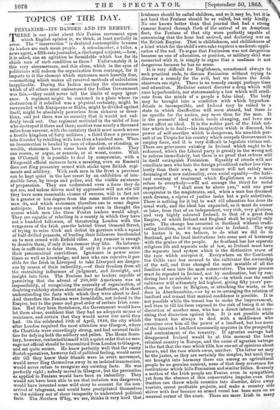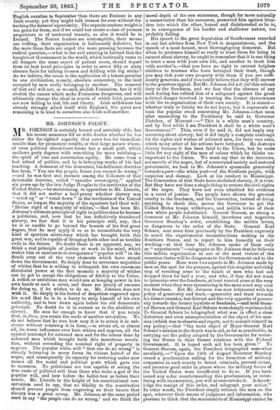TOPICS OF THE DAY.
FENIANISM—ITS DANGER AND ITS REMEDY.
THERE is one point about this Fenian movement upon which English opinion is, we think, at least partially in error. The " insurrection " is declared contemptible because its leaders are such mean people. A schoolmaster, a tailor, a news agent, a fifth-rate journalist, a discharged serjeant,—how, it is asked, can an agitation be formidable which has for its chiefs men of such condition as these ? Unfortunately it is this very circumstance, and this alone, which in the eyes of politicians will redeem the organization from contempt, for it imparts to it the element which statesmen most heartily fear, —something which makes all received methods of calculation inapplicable. During the Indian mutiny the circumstance which of all others most embarrassed the Indian Government was this,—they could never tell the limits of sepoy ignor- ance. A regiment might be cantoned in a place where its destruction if it rebelled was a physical certainty, might be surrounded with Europeans or Sikhs, might be divided against itself, might be absolutely powerless from sickness or deser- tions, and yet there was no security that it would not sud- denly break out. One regiment mutinied in the midst of foes who destroyed it there and then; another rose nearly a thousand miles from succour, with the certainty that it must march across a hostile kingdom of forty millions ; a third threw a province into disorder by rebelling with less than a hundred men. When an insurrection is headed by men of education, or standing, or wealth, statesmen have some basis for calculation. They can reason, or argue, or concede, or at worst, coerce. With an O'Connell it is possible to deal by compromise, with a Fitzgerald official menaces have a meaning, even an Emmett does not fling peasantry armed with sticks upon British regi- ments and artillery. With such men in the front a province can be kept quiet in the last resort by an exhibition of irre- sistible force, by troops and police, and the visible existence of preparation. They can understand even a force they do not see, and unless driven mad by oppression will not stir till they have some reasonable chance of success, will in fact act in a greater or less degree from the same motives as states- men do, and which statesmen therefore can in some degree anticipate. But no man can anticipate even in thought the course which men like these Fenian leaders would adopt. They are capable of rebelling in a county in which they have not a hundred followers, of threatening London with the vengeance of the Irish quartier behind Great Ormond Street, of trying to seize Cork and defeat its garrison with a squad of half-drilled peasants, of hurling their followers barehanded on to men armed with Enfield rifles. Any rumour is enough to deceive them, if only it is a rumour they like. No informa- tion is sufficient to deter them, if only it is at variance with their preconceived convictions. Ignorance is power some- times as well as knowledge, and men who can conceive it pos- sible for the Irish in Liverpool to take Liverpool are danger- ous by reason of their imbecility,—of their freedom from all the restrainineb influences of judgment, and foresight, and insight into facts. The Fenians had no leaders capable of perceiving that the advent of 200,000 Americans was an impossibility, of recognizing the necessity of organization, of doubting rubbishy stories about military disaffection, of in short understanding the facts with which they were about to deal. And therefore the Fenians were formidable, not indeed to the Empire, but to the peace and good order of certain Irish coun- ties. Had they been Scotchmen, the Government would have let them alone, confident that they had no adequate means of resistance, and certain that they would never rise until they had. On the celebrated 10th of April, 1848, the city which after London required the most attention was Glasgow, where the Chartists were exceedingly strong, and had unusual facili- ties for defying both the soldiery and police. The Home Secre- tary, however, contented himself with a quiet order that no mes- sage not official should be transmitted from London to Glasgow, and sat quite secure. He knew perfectly well that the canny Scotch operatives, however full of political feeling, would never stir till they knew their friends were in overt movement, would never fling themselves away in an isolated insurrection, would never refuse to recognize any existing facts. He was perfectly right ; nobody moved in Glasgow, but the precaution as applied to Fenians would have been an imbecility. They would not have been able to see that isolation was dangerous, would have invented some wild story to account for the non- arrival of telegrams, and would have precipitated themselves on the soldiery out of sheer incapacity to understand political facts. The Northern Whig, we see, thinks it very hard that
not hard that Fenians should be so called, but only kindly. No one knows better than that journal that had a strong rumour floated through Cork of the arrival of an American. fleet, the Fenians of that city were perfectly capable of announcing that the hour had arrived, and declaring war on the British Empire. That is childishness, and childishness of a kind which for the child's own sake requires a moderate appli- cation of the rod. To argue that Fenianism was not dangerous- because no one of education, or position, or military skill was- connected with it, is simply to argue that a madman is not dangerous because he has no sense.
It is very difficult for Englishmen, accustomed always to seek practical ends, to discuss Fenianism without trying to discover a remedy for the evil, but we believe the Irish observers are right. There is no remedy except perhaps time and education. Medicine cannot discover a drug which will cure hypochondria, nor statesmanship a law which will eradi- cate from the minds of a people a false ideal. The body may be brought into a condition with which hypochon- driasis is incompatible, and Ireland may be raised to a state in which disaffection will seem absurd, but there is no specific for the nation, any more than for the man. It is the peasants' ideal which needs changing, and laws can never affect an ideal. It is the nobler part of the Irish cot- tier which is in fault—his imagination which is diseased, his power of self-sacrifice which is dangerous, his unselfish pur- suit of an Utopia for his country which compels Government to employ force, and it is very difficult to legislate virtues out. There are grievances existing in Ireland which ought to bo redressed, which the Liberal party is greatly in the wrong not to redress immediately, but there is no proof that redress wilt in itself extinguish Fenianism. Equality of creeds will not conciliate men who hate the foreign priesthood rather less viru- lently than their own, a new tenure will not satisfy men dreaming of a new nationality, even social equality—the habi- tual courtesy of treatment which Englishmen as a nation refuse to everybody—will not assuage the thirst for social superiority. " I shall soon be above you," said one poor conspirator to the magistrates, and, when a man has dreamed such dreams, a regime of justice looks but a pale substitute. There is nothing for it but to wait till education has done ite usual work, and the ideal has expanded, as it must do sooner or later, from that of an independent, very rich, very glorious,. and very highly coloured Ireland, to that of a great free Empire, of which Ireland and England shall be equally only parts. The change has occurred in Scotland without eradi- cating localism, and it may occur also in Ireland. The way to hasten it is, we believe, to do what we did do in Scotland, get the local institutions into some sort of harmony with the genius of the people. As Scotland has her separate religious life and separate code of law, so Ireland must have the separate land system which is the distinctive crave of the race which occupies it. Everywhere on the Continent the Celtic race has secured to the cultivator the ownership of the soil, and thus changed the most mutable of all the families of mon into the most conservative. The same process must be repeated in Ireland, not by confiscation, but by ren- dering land as saleable as a watch,—in which case the small cultivator will ultimately bid highest, giving fifty years' pur- chase, as he does in Belgium, or attacking the waste, as he does in Aberdeenshire,—or by so re-arranging the relation of landlord and tenant that mutual confidence is possible. It is possible while the tenant has to make the improvement, and then to till his farm exposed to the risk of losineb it at the discretion of another man, who has a direct interest in exer- cising that discretion against him. It is not possible while the tenant has always to deal with a middleman who exercises over him all the power of a landlord, but has none of the interest a landlord necessarily acquires in the prosperity and contentment of the tenantry. If agrarian outrage had disappeared Ireland would be at this moment the least criminal country in Europe, and the cause of agrarian outrage is the fact that the race which tills, has one set of opinions about tenure, and the race which owns, another. The latter set may be the juster, as they are certainly the simpler, but until they are brought into harmony there can among an agricultural people be no genuine content, none of that deep reverence for institutions which kills Fenianism and similar follies. Scarcely a section of the Irish people are Fenian even in sympathies, yet from the absence of this conservative impulse even that fraction can throw whole counties into disorder, drive away tourists, arrest profitable projects, and make a country side shiver with fear because an armed vessel has been seen on an unusual corner of the coast. There are more Irish in many
English counties in September than there are Fenian in any Irish county, yet they might talk treason for ever without dis- turbing the farmers' equanimity. The superincumbent weight is too great for them, and if we could but create a class of yeoman
roprietors or of contented tenants, so also' it would be in Ireland. The Fenian leaders are contemptible, their means are trifling, their organization is ludicrously defective, but the more these facts are urged the more pressing becomes the vadical question,—what is the evil: existing in Ireland that the haughtiest Government in the world, which habitually turns to all dangers the same aspect of patient scorn, should depart from its beat loved principles in order to arrest fifty or sixty -obscure fools for talking treason and drilling with big sticks ? As we believe, the cause is the application of a tenure peculiar to one civilization, namely, absolute ownership, to the land occupied by men really belonging to another. The removal 'of that evil will not, as we said, abolish Fenianism, but it will abolish the causes which make Fenianism dangerous, and will 'ultimately change the ideal in search of which Irish peasants are now willing to risk life and liberty. Irish selfishness has already strongly allied itself with England, the point now aemaining is to bind to ourselves also Irish self-sacrifice.































 Previous page
Previous page